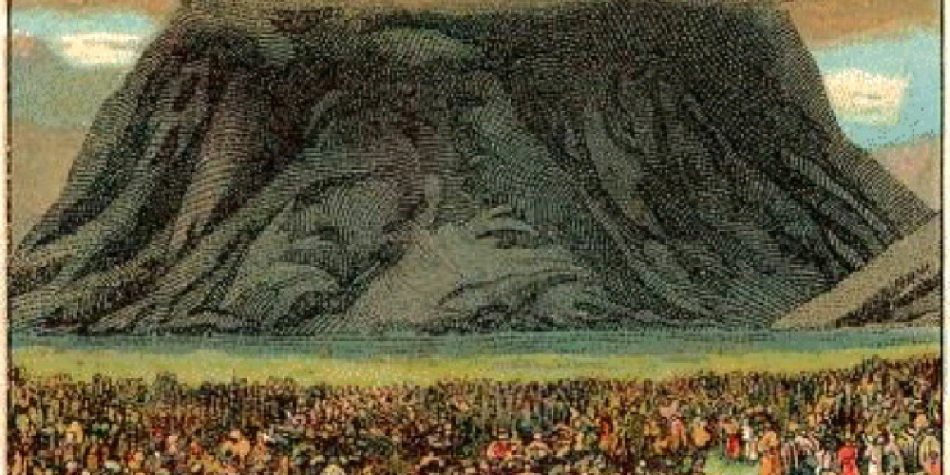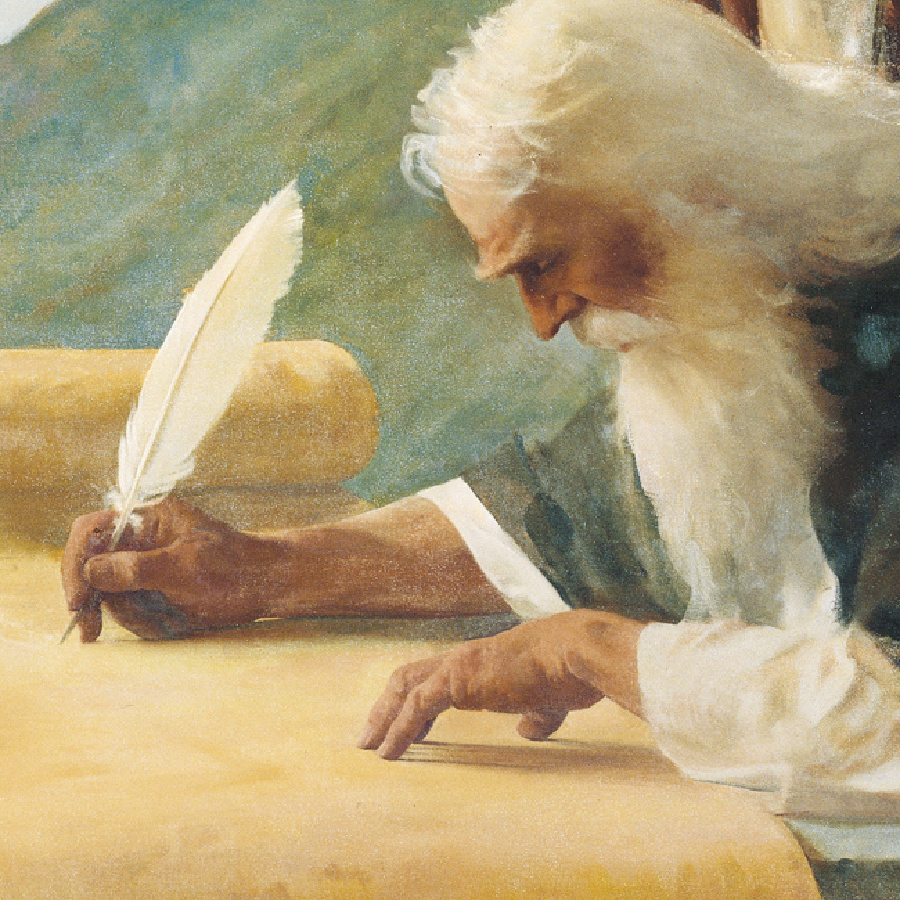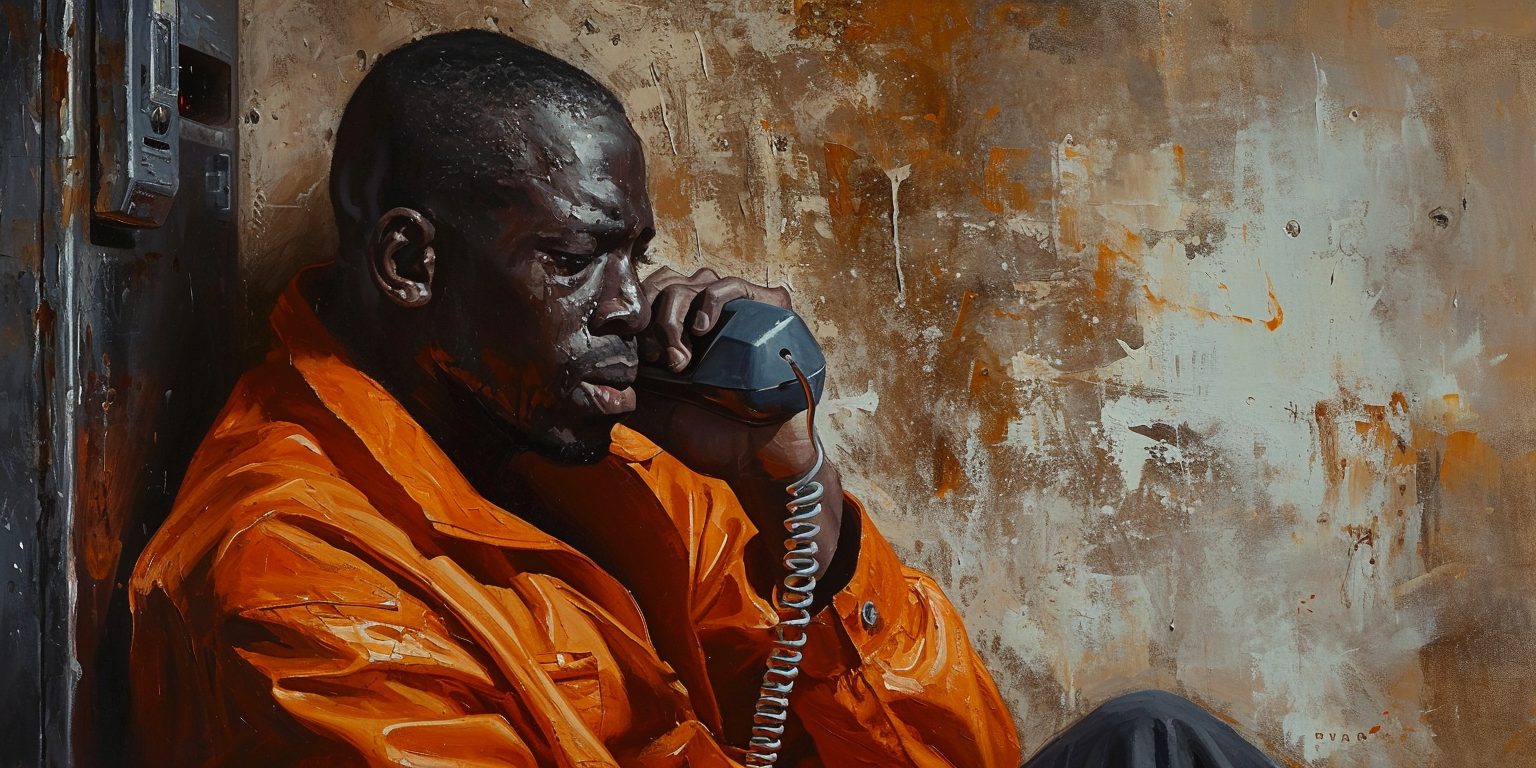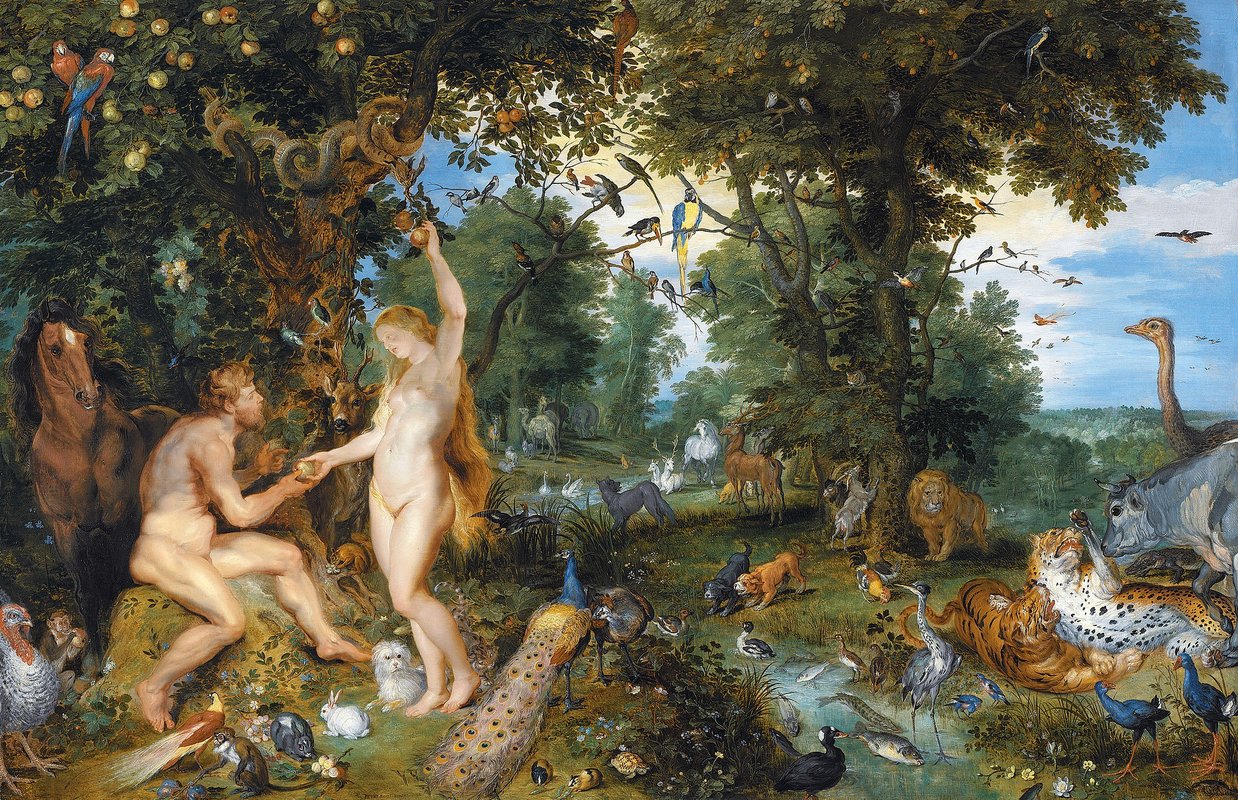When God appeared to Moses on Mount Sinai after the Israelites’ escape from Egypt, it was obviously not what the Israelites were expecting. In retrospect, it is easy to understand why. The Israelites had been under Egyptian rule for about four centuries (Genesis 15:13 and Acts 7:6 say it was 400 years; Exodus 12:40-41 and Galatians 3:17 say 430 years), and for some of that time (scripture never makes it clear how long) they had been enslaved to a Pharaoh who “knew not Joseph” (Exodus 1:8). It is probably hard to overstate the impact that living in Egypt and being enslaved by Pharaoh had on the Israelites. Theologian Walter Bruggeman, borrowing a phrase from social science, describes Egypt as totalizing, meaning that Israelites simply could not conceive of a life outside of the Egyptian culture in which they were enmeshed. In essence, not only were they a people with no way out, but the Israelites could not even imagine the idea of “a way out.”
And yet, despite being under the thumb of one of the world’s great military powers, God introduced the idea of deliverance and demonstrated a Divine power that could not be matched—not even by Pharoah. God liberated the Israelites and those that traveled with them (Exodus 12:38) from Egyptian control. There is room for a lively discussion about whether it was ‘fair’ or even ‘right’ that all of the people of Egypt suffered under the plagues attributed to God’s action (as opposed to just Pharoah), but that is for another day. From the Israelites’ vantage point, God proved His mettle. YHWH—the name given to Moses and best translated as I Was/Am/Will Be Who I Was/Am/Will Be, according to scholar Arthur Green—was a God to be followed and worshiped.
And so God led them out of Egypt … into an unforgiving wilderness, which was another profound struggle. Though freed from physical bondage, the Israelites seem to have had a hard time breaking free from the totalizing, deeper influence of Egypt. Creating a new community, based on a new way of being, proved difficult. Their physical situation had changed in a very short time, but their mental, emotional, and spiritual approach to life was a work in progress. More than once, the Israelites bemoaned their situation in the wilderness and openly complained about their liberation, apparently preferring the predictability of bread to eat (even if it meant enslavement) over the unpredictability of following a cloud through the desert (even if it meant God was with them). In hindsight, it is too easy to criticize Israel for this. I am increasingly convinced that our criticism comes quickly precisely because the Israelites’ challenges and perspectives hit a little too close to home. In our modern-day wildernesses, many of us would likely trade (or are currently trading) away a little bit of true freedom for a little physical predictability. Still, despite all of this, God persisted with Israel, and eventually, the Israelites arrived at Mount Sinai. When faced with the opportunity to directly interact with God, the Israelites backed away.
The narrative in Exodus goes on to state: “And all the people saw the thunderings, and the lightnings, and the noise of the trumpet, and the mountain smoking: and when the people saw it, they removed, and stood afar off. And they said unto Moses, Speak thou with us, and we will hear: but let not God speak with us, lest we die” (Exodus 20:18-19). When faced with the opportunity to directly interact with God, the Israelites backed away. In effect, they said, “Moses … this is a lot, and it’s a little frightening if we’re being honest. … How ‘bout you talk to God and just tell us what he says.” Moses tried to convince them that they were ready, that they could do this. Moses is recorded as saying, “Fear not: for God is come to prove you, and that his fear may be before your faces, that ye sin not” (Exodus 20:20). But the Israelites were having none of it. Rather than joining Moses in experiencing the theophany firsthand, “the people stood afar off, and Moses drew near unto the thick darkness where God was” (Exodus 20:21).
Again, I think we too easily criticize the Israelites for their reaction. Many believers, including members of The Church of Jesus Christ of Latter-day Saints, embrace the notion of encountering God firsthand through the Holy Ghost (and eventually more). We—and I include myself here—tell ourselves that if we were back at Mount Sinai, we would have stayed to listen. We tell ourselves that we listen to the Spirit in our life now, so we are encountering God on a daily basis.
And, of course, there is truth in this. Certainly, and the scriptures make this clear, God interacts with creation through the Holy Ghost. But this is also false equivalency because that is not what happened on Mount Sinai. God did not say, “come to Mount Sinai where the ‘still small voice’ will guide you.” God said, “come to Mount Sinai to experience Me directly.” God was offering to give the Torah (the moral, ethical, legal, and ritual teaching that would turn a group of formerly enslaved people into a holy community) directly to the people of Israel—not simply through the Spirit, but directly; not through whisperings, but by God’s own voice. And engaging God directly meant being willing to embrace the ground-shaking, earth-quaking, trumpet-sounding, smoke-billowing, paradigm-shifting experience that came along with it. And this, in my opinion, is an entirely different proposition than being open to the Holy Ghost’s influence, and thus, I think any criticism we might levee against the Israelites for their hesitancy should be more carefully considered. The fact is that when faced with the reality of God’s direct presence the people of Israel preferred to have a buffer; they preferred to have Moses relay the messages of God. I am not convinced we are that much different in many respects.
Something between us and God. This context matters in order to understand the story of the golden calf. As leaders of the Church of Jesus Christ (among many others) have pointed out, the story of the golden calf is a story about ‘idolatry.’ (See, for instance, Spence W. Kimball’s 1976 article “The False Gods We Worship” which is referenced in the Church’s Come, Follow Me study guide section that covers the Ten Commandments.) But idolatry in the context of the golden calf story has shades of meaning that are often missed. The kind of idolatry we see in the golden calf story is not really a story of ‘worshiping a statue instead of God;’ it is a story about wanting to worship God, but also wanting a buffer. It is a story about giving away the option of interacting with God directly. It is a story about focusing on the wrong thing even while the people believed they were worshiping in the right way. But I am getting ahead of myself. Let us look at the narrative first. The idolatry we see in the golden calf story is in wanting to worship God but from a safe distance,
When the people saw that Moses was so long in coming down from the mountain, the people gathered against Aaron and said to him, “Come, make us a god who shall go before us, for that fellow Moses—the man who brought us from the land of Egypt—we do not know what has happened to him.”… and [Aaron] cast in a mold, and made it into a molten calf. And they exclaimed, “This is your god, O Israel, who brought you out of the land of Egypt!” When Aaron saw this, he built an altar before it; and Aaron announced: “Tomorrow shall be a festival of [YHWH]!” Early [the] next day, the people offered up burnt offerings and brought sacrifices of well-being (Exodus 32: 1, 4-6).
What is clear from this text is that the Israelites were not worshiping a golden calf instead of God. That was never the intent; after all the presence of God was still immediately visible to them on Mount Sinai. They knew the difference between God and the golden calf. In fact, after the calf is constructed, they had a “festival of YHWH” (the name of God given to Moses at the burning bush), and the next day the Israelites “offered up burnt offerings and brought sacrifices of well-being”—all of which was ritually consistent with YHWH worship. Every indication is that they continued to believe in and worship YHWH. Rather, the real problem the Israelites were trying to solve with the golden calf was what to do given that “Moses was so long in coming down from the mountain.”
Recall that prior to Moses ascending Mount Sinai, the Israelites declined to experience God’s presence directly and preferred for Moses to interact with God and simply relay God’s messages to them. But with Moses gone what was going to happen? Were they going to be forced to interact with God directly? What would that look like? This man “who brought us forth from the land of Egypt” had disappeared. With Moses absent, the Israelites wanted another buffer, and (pulling from their contemporaneous culture) a golden calf seemed to fit the bill. The golden calf, a symbol of power, served to represent God to the people. It functioned, like Moses, as a buffer of sorts between the people and God. It was a way to ‘safely’ have God around without having to experience the full brunt of that presence. Thus, Aaron’s statement that the golden calf is “your god, O Israel, who brought you out of the land of Egypt” is not a misattribution of God’s saving power to an inanimate object; it is Aaron’s way of saying, “this golden calf represents the God who brought you out of Egypt and it invites God’s presence in a safe and manageable way.” The idolatry present in the golden calf story was not worshiping the wrong God; the idolatry we see in the golden calf story is in wanting to worship God but from a safe distance, and, in this instance, through the (mis)use of an intermediary (the golden calf) that they crafted for themselves.
Idolatry understood in this way is far more applicable to modern believers. It has been my experience that discussions in Latter-day Saint church meetings which touch on idolatry generally take as a given that most people aren’t literally worshiping false Gods—casting this, instead, as something only those more benighted people in Biblical times had done. Instead, in these discussions, we tend to frame the issue more metaphorically and within the context of prioritization—do we ‘prioritize worldly things’ above God (money, status, recreation, etc)? This improper prioritization is sometimes termed idolatry. And because it is probably the case that many folks are doing OK with regards to prioritization (or at least they think they are) discussion of idolatry rolls off our backs like water off a duck. Without discounting that approach entirely, I think the golden calf narrative points to a different challenge. In Exodus 32, idolatry is not a question of prioritization. Idolatry starts with allowing, or wanting, or even preferring something to stand in between us and God. And thus, idolatry, at its heart, is trying to create a situation where we can worship without the risk of direct Divine encounter. Perhaps more often than we realize, idolatry is the human attempt to domesticate God. And this kind of idolatry is far more tempting for modern believers and more prevalent than we might want to admit.
Make no mistake about it, direct Divine encounters can be scary. To be clear, as noted above, I am not talking about the whisperings of the Holy Ghost gently guiding us along our path. I am talking about something different. I am talking about the kinds of direct encounters we see in the lives of Abraham, Sarah, the Jacobs of the Old Testament and Book of Mormon, Enos, Alma the Younger and the Sons of Mosiah, and Joseph Smith—as well as in the writings of Hildegard von Bingen, Julian of Norwich, and others. I am talking about encounters that are sometimes literally and sometimes metaphorically ground-shaking, earth-quaking, trumpet-sounding, smoke-billowing, paradigm-shifting experiences. These kinds of encounters are risky because, in the end, they demand so much of us. It’s not surprising that many of us, and I include myself here, might prefer to avoid this risk. We are content to worship from a distance. We want to worship God, but we also want to do it ‘safely.’ Idolatry, at its heart, is trying to create a situation where we can worship without the risk of direct Divine encounter.
- Scriptures as Idol—Many theologians and commentators have discussed the idea of ‘bibliolatry.’ Briefly this idea suggests that, in some instances, engaging with and defending scriptural texts can become an end in itself. The sacred text itself, and not the God behind it, becomes the focus of our worship (e.g. being more concerned with the ideal frequency of reading or defending a particular truth-claim about or found in scriptures, than whether such actions are helping foster a relationship with God). Sacred texts are critical in that they can help us see the ways in which God interacts with creation and there is rightly a focus on regular reading and study of the standard works in the Latter-day Saint community. But when an encounter with scripture becomes more important than having an encounter with God, we are perhaps engaging in a form of idolatry.
- Church as Idol—The companion to bibliolatry is ‘ecclesiolatry.’ The idea here is that, in some instances, membership and participation in church and church-related activities can become an end itself (e.g. we are more concerned with attending church or with our loyalty to church, than with how it connects us to God). When this happens, dedication to church supplants dedication to God, and the actions of church attendance take precedence over the purpose of worship. In my view, and as President Dallin Oaks recently affirmed, the importance of a strong worship community is an indisputable premise—we need a church. The strength of the Latter-day Saint church community is one of the defining characteristics of our faith. But when our faith is more strongly centered in a specific organizational construct than it is in God, or when our engagement in an organization becomes more immediately and emotionally important than our engagement with God, we are again, perhaps engaging in a form of idolatry.
- Leaders as Idol—Brigham Young once worried that Latter-day Saints would have “so much confidence in their leaders … [that they would] settle down in a state of blind self-security, trusting their eternal destiny in the hands of their leaders with a reckless confidence that in itself would thwart the purposes of God in their salvation.” A term that might work here is ‘episcopolatry’ (if taken in a more general sense of not referring only to a specific office, the ‘episcopy’ or bishop, but to church offices broadly). The fact that our faith community is guided by inspired men and women is, I believe, part of why the Latter-day Saint message resonates with so many people. Keeping in mind Nathaniel Givens’ recent discussion of prophetic fallibility (which, again, I think can be reasonably generalized to anyone in a leadership position), when our confidence in our leaders is (to use Brigham Young’s terms) ‘reckless’ and characterized by ‘blind self-security’—that is to say, when we forgo direct Divine encounter and cede such things to our leaders—we are potentially engaging in another form of idolatry.
One of the reasons I love the Old Testament is the fact that, even though it is an ancient text, it continues to potently challenge believers’ hearts and minds today. The experience of the Israelites at Mount Sinai is no exception. The story of the golden calf challenges us to consider how, and in what ways, we might be avoiding direct Divine encounter because a more domesticated approach to worship requires less of us. This story challenges us to critically examine our worship lives and consider where we may be giving away the option of interacting with God directly and where we may be focusing on the wrong thing even while trying to worship God. As the story in Exodus makes clear, God wants to engage us directly. God is present to us today. Are we willing to ascend the cloud-covered mountain in order to encounter the One whose voice is the voice of thunder and whose presence causes the earth to quake? Are we willing to directly engage the ultimate source of our liberation and freedom? Are we willing to put away our favorite idols and take the risk of hearing the voice of God for ourselves?

















